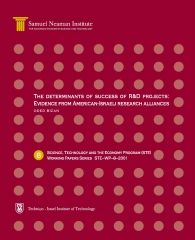A basic premise of Israeli R&D support programs has been the principle of neutrality all eligible projects are funded. With a binding budget constraint, however, the government has to select the projects it funds and thus to depart from neutrality.
An optimal departure would favor those projects that have less of a chance to succeed without support. In this paper, I examine the performance of government supported collaborative research projects. I find that size and organizational form affect the probability of technical success and duration to commercialization in a way that suggests departing from neutrality by preferring less established firms.












